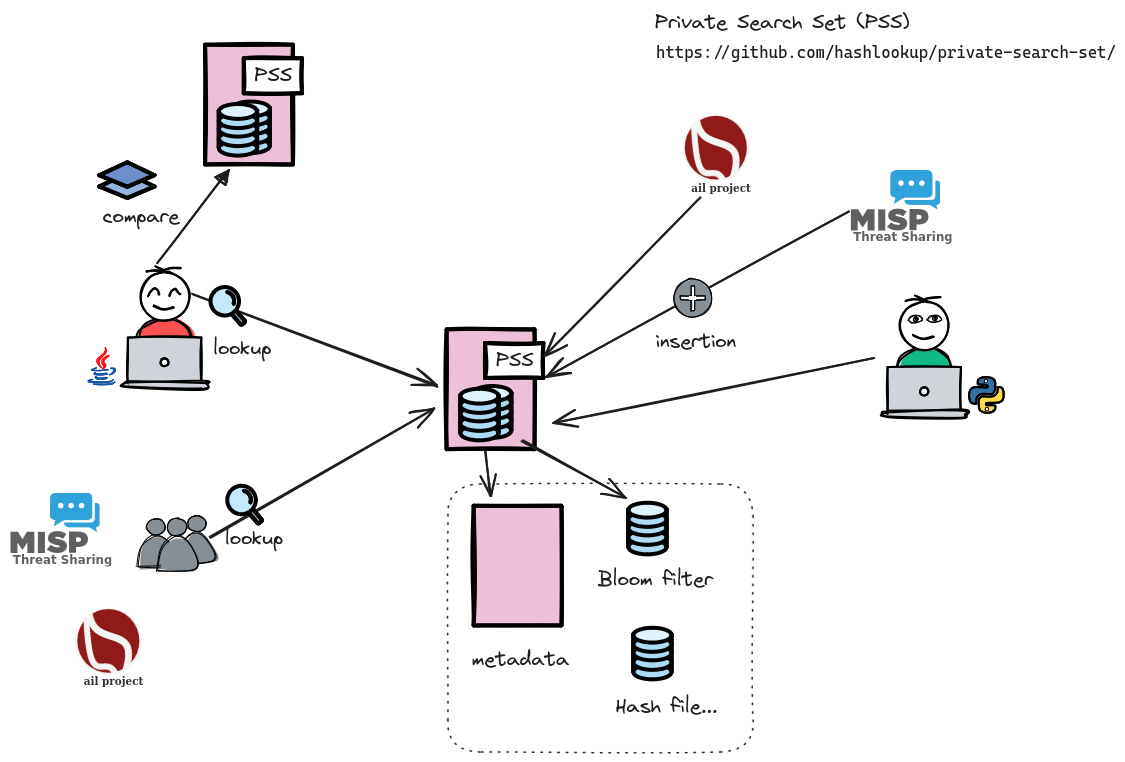private-search-set
Private Search Set (PSS)
Private Search Set (PSS) is an extension to standard Bloom filter or a standalone hash file to describe and share private set.

Abstract
The Private Search Set (PSS) is an extension to the standard Bloom filter or a standalone hash file to describe and share private set. It provides features such as fast lookup of values without disclosing the values, easy distribution of private sets to a group of users or organizations, watermarking and tracking down potential leak of a private search set (PSS), offline private search, and flexible meta-format to describe and extend the private search set (PSS).
Features
- Fast lookup of values (such as indicators, hashes or any text) without disclosing the values
- Easily distribute private sets to a group of users or organisations
- Watermarking and tracking down potential leak of a private search set (PSS)
- Offline private search
- Flexible meta-format to describe and extend the private search set (PSS)
Use-cases
- Improved privacy and security for users and organisations willing to participate in information sharing communities
- Reduced risk of data breaches and leaks of cyber threat intelligence
- Increased ability to protect sensitive information or information which could be abused such as CSAM (Child Sexual Abuse Material) or personal information leak
- Enhanced ability to share information with trusted parties without compromising privacy
Overview of creation and lookup of PSS
flowchart TD
Y["canonize(foobar.onion)"] --> A
A["insert keyhashed(foobar.onion)"] -->|key, Blake2| B[key-hashed]
B --> |insert| C[Distributed PSS file]
B --> |insert| D[Distributed PSS Bloomfilter]
style B fill:#0f0,stroke:#333,stroke-width:4px
style Y fill:#0f0,stroke:#333,stroke-width:4px
style A fill:#0f0,stroke:#333,stroke-width:4px
style Z fill:#fff,stroke:#333,stroke-width:4px
Z["search keyhashed(canonized foobar.onion)"] -->|search| C
Z["search keyhashed(canonized foobar.onion)"] -->|search| D
Meta format
| Key name | Type | Description | Required |
|---|---|---|---|
version |
number |
Version of the Private Search Set (PSS). | ✓ |
name |
string |
A concise name used for the directory name. | ✓ |
description |
string |
Human readable description of the set. | ✓ |
generated-timestamp |
number |
Generation timestamp in epoch format. | ✓ |
algorithm |
string |
Keyed-hash message authentication. Available: - Blake2b - Blake3 - HMAC-SHA-256 - HMAC-SHA-512 |
✓ |
keyid |
string |
The reference to the key used in the keyed-hash message authentication algorithm. If the default value is used, then the private shared key infected. |
✓ |
filter |
hash |
The filter description along with its type, format and model. | ✓ |
misp-attribute-types |
array |
Array of string with the types covered by the private search set. Types can be any from types mentioned in the default MISP types. If not specified, text type is covered. |
- |
misp-object-template |
array |
Array of string with the object template name and the version separated with a semicolon such as person:19. |
- |
canonicalization-format |
string |
Meta function used expressed in Python functions. Such as lower()[:10] |
- |
openpgp-encrypted-key |
string |
Base64 OpenPGP message encrypting the reference keyid. This is optional as the key can be distributed in different means such as dedicated MISP API key or other secure channel. |
- |
Meta format format
Format type bloomfilter
| Key name | Type | Description | Required |
|---|---|---|---|
capacity |
number |
Capacity of the BloomFilter | ✓ |
fp-probability |
number |
Probability of false-positive | ✓ |
format |
string |
Format of the BloomFilter such as dcso-v1 or poppy-v2 |
✓ |
match-count |
number |
Number of count match to confirm if it’s a positive match. Default is 1. |
‐ |
List of known bloomfilter format
| Name | Description |
|---|---|
dcso-v1 |
DCSO BloomFilter using 64-bit FNV-1 hash function. |
poppy-v2 |
Poppy using 64-bit with wyHash. |
Format type misp-feed-cache
Sample
{
"algorithm": "Blake2",
"format": [
{
"bloomfilter": {
"capacity": 10000,
"format": "dcso-v1",
"fp-probability": 0.001
}
},
{
"misp-feed-cache": {}
}
],
"canonicalization-format": ".lower",
"description": "List of Tor hidden services containing child sexual abuse material (CSAM).",
"generated-timestamp": 1700731642,
"keyid": "tor-csam-lea",
"misp-attribute-types": [
"text",
"url",
"link"
],
"version": 1
}
Feed format
The feed format is composed of a directory with the following structure:
private-search-set.pss- Private search as a standalone file.OneOfrequiredprivate-search-set.json- Meta data of the private search file.requiredprivate-search-set.bloom- Bloomfilter file of the pss set.OneOfrequired
Those two files can be included in a MISP feed format export. The feed can contain a single Bloom filter set along with meta-data or a hash list file with the hash values or even both files with the meta-data.
MISP Object template
A private-search-set MISP oject template will be created to be able to share PSS via MISP.